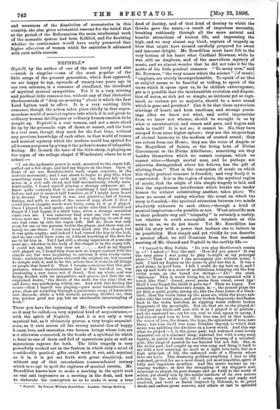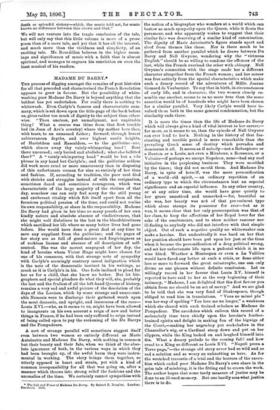NEPHELE.*
Nepheli, by the author of one of the most lovely and also —which is singular —one of the most popular of the little songs of the present generation, which first appeared, we are happy to say, upwards of twenty-two years ago in our own columns, is a romance of cloudland, the cloudland of mystical musical sympathies. Yet it is a very stirring and poetical little romance too, without any of that rhetorical rbodomontade of "deep no-meaning" about it which the first Lord Lytton used to affect. It is a very exciting little romance, though the action takes place chiefly in that supra. mundane world of musical rapture into which it is not given to ordinary human intelligence or ordinary human emotion to be caught up. Nephele is a real woman, and not a mere cloud lit up by the prismatic rays of dawn or sunset, and the hero is a real man, though they meet for the first time, without any previous knowledge of each other, in that world of trance and musical mystery which the modern world has spoiled for all human purposes by giving it the pedantic name of telepathic feeling. Mr. Gerard, the hero of the little story, is playing on the organ of the college chapel (? Winchester) where he is at school :— " I set the hydraulic power to work, mounted to the organ loft, pulled out a few stops, and laid my fingers on the keys. Open in front of me was Mendelssohn's sixth organ concerto, at the andante movement ; and I was about to begin to play this, when something seem to turn aside my will; my fingers fell on the notes in a rich soft chord, and half unconsciously, wholly unin- tentionally, I found myself playing a strange unknown air. I knew quite certainly that it was something I had never heard before, and yet it seemed half familiar, as if I might have heard it in dreams. Very sweet it was, and plaintive, full of human feeling, and with so much of the sense of song about it that I could almost imagine words were being sung to it as I played. Once I played it, and again ; and to make sure that I should not forget it I had begun it a third time, when a strange sensation came over me. I was conscious that some one else was some- where near me. I turned round, as I was playing, to see if any Ione had come up into the organ loft. But no, there was only room for one or two persons beside the player, and there was cer- tainly no one there. I rose and went down into the chapel, but it was quite empty ; and indeed I had turned the key in the lock, and no one could have come in without knocking at the door for me to let him in. Yet I had still a strong impression of some one near me ; whether in the body of the chapel or in the organ loft, I could not say, but very near me And as my fingers still played on, I found they were now no longer content with the simple air, but were beginning to entwine it with lovely varia- tions: variations that never obscured the original air, but seemed to mingle with it, and to be the echoes that it woke in all things or people that heard it. Then I became conscious that this girl- presence, whose mysteriousness had at first terrified me, was awakening a new sense, not of dread, - that my whole soul was being flooded with its sympathies and graces, and that the un- explained desire, the desire of the moth for the star,' that we call Love, was quickening within me. And with this feeling the music—that I myself was playing—grew more tumultuous, the pure, clear air sounding through a passionate surge of harmonies and discords, while a wild ecstatic yearning thrilled me, that was neither grief nor joy, but an unutterable intermingling of both."
There you have the beginning of Mr. Gerard's acquaintance as it may be called,—a very mystical kind of acquaintance,— with the spirit of Nephele. And it is not only a very mystical but, as it ultimately proves, a very tragic acquaint- some, as it cuts across all the strong natural ties of happy himan love, and enmeshes two human beings whose lots are n)t otherwise connected, in the bonds of a spiritual tie which i3 fatal to one of them and full of mysterious pain as well as mysterious rapture for both. The little tragedy is very powerfully worked out in the fashion in which only a mind of considerable poetical gifts could work it out, and, mystical as it is, it is yet set forth with great simplicity, and without any of that ostentatious transcendental ecstasy which is so apt to spoil the raptures of musical reverie. Mr. Bourdillon knows how to make a meeting in the spirit read as real and impressive as a meeting in the flesh, and how to elaborate his conception so as to make it seem a true
• Neph.14. By Francis William Bourdillon. London: George Bederly. deed of destiny, and of that kind of destiny to whieh the Greeks gave the name,—a result of imperious necessity, breaking ruthlessly through all the more natural and bumble attractions of human life, and impressing the high, and we may almost say bleak, rapture of tragedy on lives that might have seemed carefully prepared for sweet and innocent delight. Mr. Bourdillon must have felt to the very bottom of his heart what Cardinal Newman, while he
was still an Anglican, said of the marvellous mystery of music, and we almost wonder that he did not take it for the motto of his little poetical romance. "To many men," said Dr. Newman, "the very names which the science" [of music] "employs, are utterly incomprehensible. To speak of an idea or subject seems to be fanciful or trifling, to speak of the views which it opens upon us, to be childish extravagance; yet is it possible that the inexhaustible evolution and disposi-
tion of notes, so rich yet so simple, so intricate yet so regu- lated, so various yet so majestic, should be a mere sound which is gone and perishes ? Can it be that those mysterious
stirrings of heart, and keen emotions, and strange yearn- ings after we know not what, and awful impressions from we know not whence, should be wrought in us by what is unsubstantial, and comes and goes, and begins and ends in itself? It is not so ; it cannot be. No, they have escaped from some higher sphere ; they are the outpourings of eternal harmony in the medium of created sound ; they are echoes from our Home; they are the voice of Angels or the Magnificat of Saints, or the living laws of Divine Government or the Divine Attributes ; something are they besides themselves which we cannot compass, which we cannot utter,—though mortal man, and he perhaps not otherwise distinguished above his fellows, has the gift of eliciting them." That is the conception of music on which this slight poetical romance is founded; and very finely it is constructed. It is in the region of music, the mystical region of music, that the origin of this simple tragedy is laid, and that the superhuman interference which breaks one tender human tie without substituting another, takes place. We have no means of saying whether the event on which the story is founded,—the spiritual attraction between two minds absolutely unknown to each other,—through a kind of musical inspiration,—be possible or not. What scientific men in their pedantic way call " telepathy " is certainly a reality, but whether it could accomplish such wonders as this seems to us, we do not know. Yet Mr. Bourdillon has told his story with a power that inclines one to believe in its possibility. How simply and yet vividly he can describe a musical effect, we will illustrate from the first musical meeting of Mr. Gerard and Nephele in the earthly life :—
" I turned to Miss Dalisle. Do you play Beethoven's sonata in —? ' I asked.—' Yes,' she said. ' How did you guess ? It was the very piece I was going to play to-night as my principal piece.'—' Then I think I can accompany you without notes,' I said. I laid my fingers on the piano to give her the A. It was a good piano, in good tune. I felt I could do my best on it, and I ran up and down in a score of modulations, bringing out the foni violin notes, as she tuned her strings.— Ah ! ' she cried, 'delicious ! This is worth living for, to be accompanied with a touch like that.' Sweet, sweet praise from sweet, sweet lips ! Shall I ever forget the thrill it gave me ? Then we began. You remember that in Beethoven's sonata in —, the pianist plays the air first, a quiet, gentle, strong air, like the June notes of a black- bird ; then the violin takes up the same air, while the piano sub- sides into the lower place, and gives broken fragments and flashes back to the violin melodies, as rippling water reflects broken fragments of the moonlight. But oh, that air as she played it ! I had put my whole self soul into it as I played it in prelude ; and she answered me, cry for cry, soul to soul, agony to agony, I had almost said love to love. But love was not in that music : the vision of love, the dream, the hope, the splendour of love, were there; but lore itself was some Paradise beyond, to which that music was uplifting the dwellers on a lower world. And this was what we played :—I, in the piano part, had wakened some lovely immortal out of a charmed sleep, wakened her with a song sung lightly, in gaiety of heart, the mellifluous lip-song of a minstrel- poet, who sings of passion he has fancied but not felt. She, in the violin part, had caught up my own song and flung it back to me with a new meaning, no more as a light love-lyric, but as a high principle of life, the cadenced code of a Heaven whose laws are Love. This dreaming goddess-plaything I had so idly wakened, proved for me a most dread, yet most beautiful, spirit of lofty and imperious monition. And the music became an un- ceasing warfare ; at first the struggling of my sluggard soul, reluctant to slough its poet-dreams and go forth to the world of action, yet slowly won by the nobler instincts of its own nature echoing to the noble call; till I arose, armed and ready and resolved, and went as Barak inspired by Deborah, to do great deeds and endure great sorrows, and attain at last to splendid
death or splendid victory—which, the music told not, for music knows no difference between this crown and that."
We will not venture into the tragic conclusion of the tale, but will only say that this little volume is more of a prose poem than of a mere tale, and yet that it has all the interest, and much more than the vividness and simplicity, of an exciting tale. Mr. Bourdillon believes in the higher mean- ings and significance of music with a faith that is almost spiritual, and manages to engrave his conviction on even the least musical of his readers.



































 Previous page
Previous page